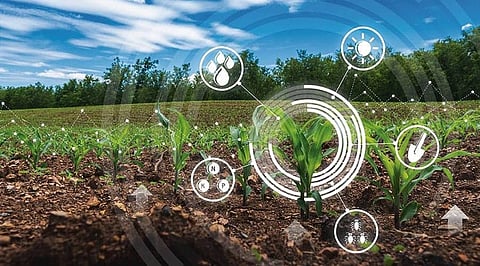

Agriculture plays a significant role in shaping the economy of a country. Automation in agriculture is the main concern of the modern world. To enhance the possibilities of AI, researchers are working on infusing technology into genomics to further establish a strong agriculture ground for the future.
Natural factors like climate change, population growth and food security concerns have propelled the industry into seeking more innovative approaches to protecting and improving crop yield. As a result, Artificial Intelligence (AI) is steadily emerging as part of the industry's technological evolution. Applications like agriculture robots, crop and soil monitoring and predictive analysis are taking centre stage in leading agriculture through technology. Agriculture is a US$5 trillion industry, and now the sector is turning to AI technologies to help yield healthier crops, control pests, monitor growing conditions, help with the workload, and improve a wide range of agriculture-related tasks in the entire food supply chain. In the sidelines, AI is also helping farmers figure a variety of real-time situations; weather conditions and temperature to be better inform their decisions.
With a diverse approach by technology, farming is already seeing a change in its functionalities. Currently, researchers are looking for ways to intrude genomics using AI applications. With the fact of a growing global population, changing climate and environmental pressure, there is an urgent need to accelerate breeding novel crops with higher production, drought or heat tolerance, and less pesticide usage. Genomics is a branch of molecular biology focused on studying all aspects of a genome or the complete set of genes within a particular organism. Advances in genomics offer the potential to speed up the process of developing crops with promising agronomic traits. Agriculture genomics is the application to improve productivity and sustainability in crop and livestock production. Using modern technology, farmers and researchers can easily identify the genetic markers linked to desirable traits, informing cultivation and breeding decisions.
Researchers are using machine learning to identify patterns within high volume genetic data sets. These patterns are then translated to computer models which may help predict an individual's probability of developing certain diseases or help inform the design of potential therapies. Direct-to-consumer genomics encompasses companies who offer genomics sequencing services to individual consumers. Companies are using machine learning to achieve greater depth in the interpretation of genetic information such as how an individual's genes may impact their weight. Current applications of machine learning in the field of genomics are impacting how genetic research is conducted; how clinicians provide patient care and make genomics more accessible to individuals interested in learning more about how their heredity may impact their health.
Genomics opens the door to potentially improve soil quality and crop yield. By leveraging technology into genomics, the agriculture sector can thrive in the digital era where people are more concerned about the urban area and are leaving the farming background behind. Genomics could make cultivation easy that people living in cities can enable indoor farming and vertical farming methods.
For example, PathoGn, a California-based start-up used Illumina Accelerator in 2015 to combine genomics and machine learning to build diagnostic tools aimed at predicting and preventing diseases in crops. The company is currently known as Trace Genomics. It is focusing on soil health. If genetic data can predict the yield or health of crops, it can also help farmers better predict and optimize yields. Such innovations used at scale could also ramp up the global improvements in crop yields that have resulted from past genetics alterations.
Join our WhatsApp Channel to get the latest news, exclusives and videos on WhatsApp
_____________
Disclaimer: Analytics Insight does not provide financial advice or guidance. Also note that the cryptocurrencies mentioned/listed on the website could potentially be scams, i.e. designed to induce you to invest financial resources that may be lost forever and not be recoverable once investments are made. You are responsible for conducting your own research (DYOR) before making any investments. Read more here.
